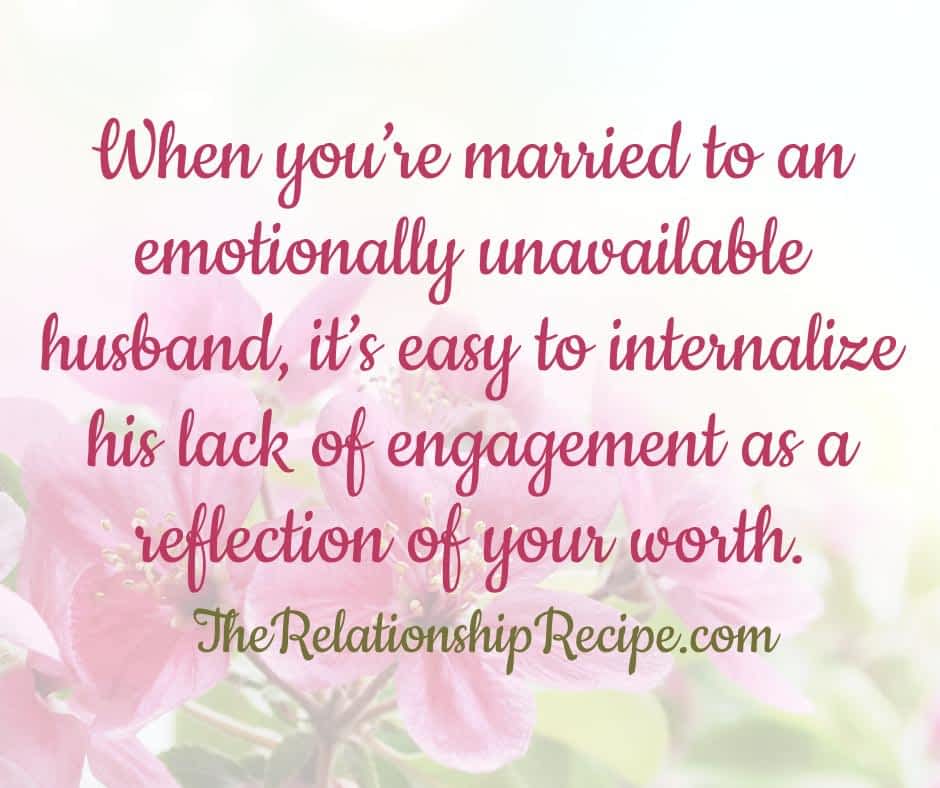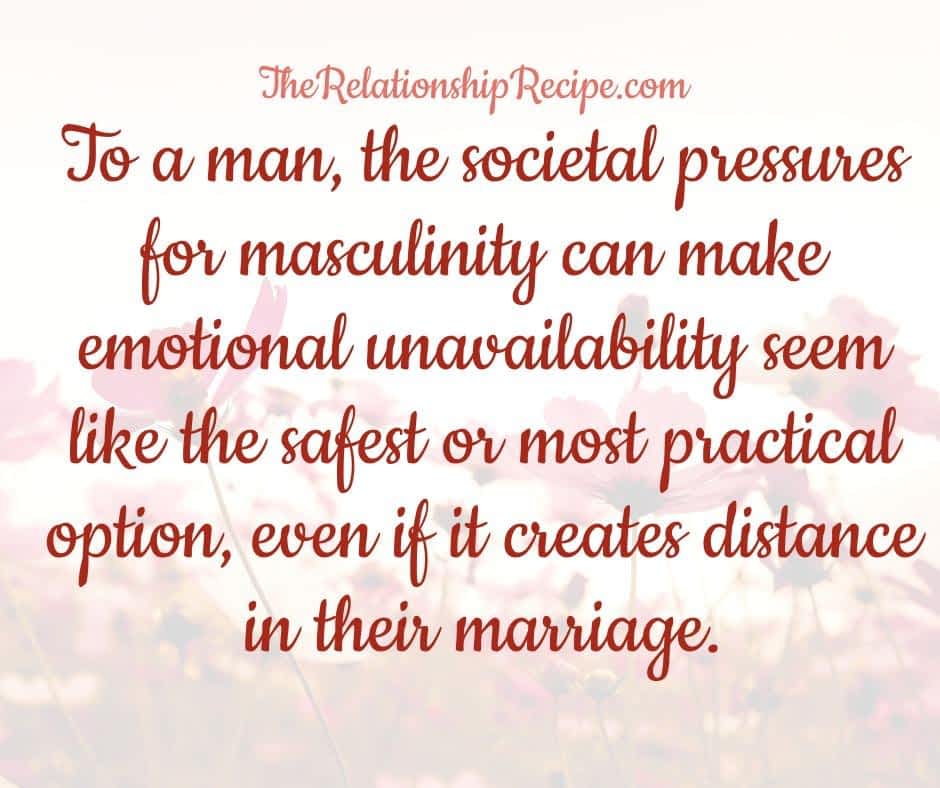50 Painful Signs of an Emotionally Unavailable Husband
It took me years to finally admit I’d married an emotionally unavailable husband. Years of feeling like I was talking to a brick wall: unseen, unheard, dismissed, and about as significant as yesterday’s junk mail.
An husband who won’t open up emotionally doesn’t just magically appear out of thin air. He’s often the end result of old wounds, unaddressed trauma, and habits that make emotionally distant. A man who can’t, or won’t, let you in.
If you’ve ever wondered why your husband seems so emotionally cold or why he just won’t open up no matter how many times you try, trust me, you’re not alone. Plenty of people end up married emotionally detached men who thinks feelings are optional.
The first step is figuring out why he acts this way so you can decide if he’s capable of real change or if you’re just wasting precious years banging on a door he has no intention of unlocking.

💡Key Highlights:
- Why your emotionally unavailable husband acts like feelings are contagious diseases
- How childhood chaos and bad role models taught him to shut down
- The sneaky ways emotional distance hides behind “I’m just tired” and “It’s no big deal”
- How perfectionism, fear, and control keep him locked in his own head
- What you can, and can’t, do to survive loving a man who can’t connect emotionally

Recently, I posted an article where I expressed surprise (and some relief) at the strange way he reacted when I told him I wanted a divorce. He was very nonchalant about it….as if he was reading yesterday’s paper!
Totally indifferent.
I think his lack of reaction was based more on his emotional unavailability, and habitual stoicism. I doubt he was expecting it, as he isn’t very in tune with our relationship. As long as things are good for him, he seems fine to ignore my unhappiness.
His reaction really shouldn’t have been a surprise. But it was anyway, because his go-to emotion is usually anger.
My husband grew up with a controlling, unpredictable, blunt and moody mother and spent most of his childhood as a latchkey kid, like so many of us Gen X babies roaming around unsupervised in the ‘70s and ‘80s. By the time he hit his teens, his parents were locked in a messy, soap-opera breakup: loud fights, flying dishes, the whole dysfunctional spectacle. When they finally split, he was basically left to raise himself.
It’s kind of wild that out of three siblings, he was the only one who ended up getting married.
Looking back, it’s no shock that emotional closeness was never his strong suit. But at the time, I didn’t have the words to call it what it was. I just knew something felt wrong. The man I married was an emotionally detached man, but I convinced myself it was just stress or leftover trauma… or the classic excuse: he just needs time. 🙄
I genuinely believed I could somehow pull him out of his shell. That was wishful thinking with a big side of denial. I was too young and too inexperienced to recognize what it really meant to be married to a man who can’t connect emotionally, or how much that would eventually wear me down.
The one silver lining in surviving a long, rocky marriage with an emotionally detached man is that when it’s finally over, you may feel battered and bruised, but you’re also crystal clear about what you’ll never settle for again.
✔️Note to self: Don’t waste time on an emotionally detached man.

✨Now, let’s unpack the psychology behind his emotional walls and why they’re so hard to break down, the 50 examples of an emotionally unavailable husband, and finally, what to expect should you decide to leave the relationship.
Why an Emotionally Unavailable Husband Might not be Obvious at First
In the beginning, having an emotionally unavailable husband doesn’t always look like a problem. Actually, he might come off as the perfect partner – attentive, sweet, maybe even borderline romantic if you squint hard enough. That’s the thing about emotional unavailability: it’s sneaky. It doesn’t always show up with a big flashing sign that says RUN FOR YOUR LIFE.
Early on, he probably did all the right things. He paid the bills, tackled the to-do list, maybe surprised you with a random bouquet or acted like he was actually listening. You tell yourself, See? He cares. You convince yourself this is what love looks like, just a little quieter. I did too. However, a man can be helpful and still be about as emotionally present as a potted plant. 🪴
A lot of emotionally distant husbands have this uncanny ability to stay just engaged enough that you keep hoping. Try to talk feelings? He suddenly has an urgent need to check the thermostat or “think about it later.” Press a little harder and watch him shut down fast.
Emotional unavailability doesn’t always look like some obvious cold shoulder. Sometimes it’s more like this low-key, passive indifference. He’s technically there, but he’s not really with you. He’s a man who can’t connect emotionally, but he’s good at pretending he’s trying.
That’s why it’s so hard to see what’s happening until you’re knee-deep in the relationship, wondering why you feel so alone. You start asking yourself how you got here, married to someone who can’t or won’t meet you where it matters most.

What Causes an Emotionally Distant Husband?
Trying to figure out what makes an emotionally unavailable husband tick is like peeling an onion with lots of layers, and usually some tears. You can’t just chalk it up to him being “wired this way.” Emotional unavailability doesn’t fall out of the sky. It’s brewed over years of messy experiences, unspoken rules, and, in some cases, flat-out trauma.
So, let’s pop the hood and take a look at why so many men turn into the man who can’t connect emotionally once they get married.
💡 Childhood Experiences and Emotional Conditioning
For a lot of emotionally distant husbands, the roots of all that detachment stretch way back to childhood. If he grew up in a house where feelings were either ignored, mocked, or punished, he probably learned early on that emotions were dangerous territory.
💔Emotional neglect: Maybe he was the kid crying alone in his room because nobody ever showed up to ask what was wrong. He learned fast that showing sadness or fear only got him ignored—or worse, scolded. So he stuffed it all down and slapped on a tough-guy mask.
💔Parentification: Some boys get shoved into adult roles before they even hit puberty. If he was busy taking care of everyone else’s chaos, he didn’t have much room to figure out his own feelings. He grew up believing his needs didn’t matter—or were just an inconvenience.
💔Inconsistent parenting: Imagine never knowing if your caregivers were going to hug you or humiliate you. If love was unpredictable, he learned to keep his guard up and his feelings locked down. Better safe than sorry, right?
These early lessons become the blueprint a lot of men drag into adulthood. That’s why you can end up married to an emotionally detached man who honestly doesn’t know how to let you in, even if part of him wants to.
💡The Influence of Masculinity Norms
It’s not just his childhood that turned him into an emotionally detached man; society loves to pile on, too. Traditional ideas of masculinity have been drilling it into boys’ heads for generations: be tough, be stoic, don’t you dare cry unless someone literally dies. Vulnerability? That’s for other people.
All those outdated rules about what it means to be a man create grown-ups who think emotional distance is normal. And here’s how it usually shows up:
💔Fear of vulnerability: A lot of men are convinced that opening up is the same as broadcasting weakness. So instead of letting you in, your emotionally distant husband would rather keep everything locked down tight. It feels safer to him even if it leaves you feeling completely shut out.
💔Discomfort with emotional language: If nobody ever taught him how to talk about feelings (or worse, told him not to), he probably has the emotional vocabulary of a brick. He’d rather avoid the whole conversation than risk saying the “wrong” thing.
💔Pressure to “fix” instead of feel: Somewhere along the line, men got the memo that their entire job is to solve problems, not sit in the mess of complicated emotions. So instead of connecting, they try to “fix” you, or they just check out altogether.
When you add it all up, the result is a man who can’t connect emotionally because he genuinely believes it’s either pointless or unsafe. From his perspective, staying detached feels like the practical choice. Of course, it also creates a giant wedge in your marriage – but hey, at least he feels in control, right?

💡Past Trauma and Emotional Scars
Unresolved trauma is another big reason you might find yourself married to a man who can’t connect emotionally. Whether it’s childhood abuse, a soul-crushing breakup, or some other betrayal he’d rather pretend never happened, old wounds have a way of sticking around and messing with every relationship that comes after.
💔Fear of rejection: Trauma teaches people that opening up is just asking to get hurt again. So instead of risking it, your emotionally distant husband shuts down. It’s his way of staying safe, even if it means you’re left feeling like you’re hugging a stone wall.
💔Attachment wounds: If he grew up being abandoned, ignored, or constantly disappointed, chances are he learned to keep people at arm’s length. That avoidant attachment style isn’t about you; it’s just him doing everything he can to never feel that old pain again.
💔Unprocessed grief: Sometimes it’s not a single moment, but a pile-up of losses nobody ever helped him work through. Maybe he lost someone close or watched his dreams implode. Either way, all that grief turns into emotional baggage he can’t (or won’t) put down.
If this stuff stays buried, it builds an almost impenetrable wall between you. The result is a man who can’t connect emotionally no matter how much he says he wants to. Because in his mind, detachment feels safer than ever risking real vulnerability again.

💡A Lack of Emotional Role Models
A lot of emotionally unavailable husbands aren’t trying to be distant on purpose, it’s more like they never had anyone show them how to actually do emotions. If his parents didn’t model healthy emotional expression (you know, like saying “I love you” without a crisis happening), he probably missed the memo on how relationships are supposed to work on a deeper level.
So what happens when no one teaches you how to feel things or connect with others in a meaningful way? You wing it… and not always well.
💔Emotional suppression: If he never learned how to process emotions, he probably just… doesn’t. Instead, he bottles them up, screws the lid on tight, and acts like everything’s fine while simmering under the surface. Classic emotionally detached man behavior.
💔Avoidant tendencies: In emotionally heavy situations he’ll steer clear, crack a joke, or suddenly remember something urgent that definitely can’t wait – like reorganizing the garage. Because emotions are unfamiliar, and unfamiliar means uncomfortable.
💔Misunderstanding intimacy: In his mind, love might equal doing stuff like paying the bills, mowing the lawn, fixing your car. He’s checking boxes, not realizing that emotional closeness isn’t something you can replace with chores. It’s how you feel with someone, not what you do for them.
You’re left trying to connect with a man who can’t connect emotionally, not because he doesn’t care, but because no one ever handed him the emotional toolbox. And somehow, now you’re the one trying to build a relationship with duct tape and a prayer.

💡Personality Traits and Mental Health
Sometimes a husband who won’t open up emotionally isn’t just dealing with old baggage or bad role models. Certain personality traits and mental health issues can also make genuine emotional connection feel like trying to hug a brick wall.
Here are a few of the usual suspects:
💔Alexithymia: Fancy word, frustrating reality. This condition makes it seriously hard for someone to identify and express their feelings. So if you ask your emotionally distant husband what’s wrong, he’s not stonewalling you on purpose; he genuinely has no clue how to put it into words. It’s like emotional charades, except nobody’s winning.
💔Introversion: Being introverted isn’t a flaw, but when it’s dialed up to eleven, it can leave you feeling like you’re living with a roommate who never comes out of his own head. He might not mean to seem so detached, but if he can’t communicate his needs, it starts to feel like you’re the only one trying.
💔Depression or anxiety: These are sneaky. A man battling depression often doesn’t have the bandwidth for emotional connection because he’s too busy just trying to get through the day. And anxiety can make him shut down out of fear he’ll say the wrong thing or become a burden. Either way, you end up with a man who can’t connect emotionally, no matter how much you wish he would.
The hardest part is, these issues don’t always show up with clear warning signs. They slip under the radar, quietly eroding intimacy until you’re left wondering how you became so lonely in your own marriage.

💡The Fear of Losing Control
Some emotionally unavailable husbands don’t just accidentally disconnect. For them, emotional detachment is a calculated move. It’s about keeping control. Vulnerability equals chaos. And if there’s one thing this guy hates, it’s feeling out of control.
Here’s what’s usually driving that emotional lock down:
💔Perfectionism: If he grew up believing that emotions are messy or “weak,” he’ll avoid showing any real feelings like it’s a full-time job. To him, being vulnerable equals being flawed, and he’s not about to let you see a crack in that armor.
💔Fear of dependence: The idea of needing someone else emotionally? Nope. Not happening. He’d rather white-knuckle his way through life than admit he might need comfort or support. Because in his world, self-sufficiency = strength. (It also = lonely.)
💔Distrust: If he’s been burned before by a partner, a parent, or anyone else who mattered, then emotional openness feels like handing someone a loaded weapon and hoping they don’t pull the trigger. So instead, your man who can’t connect emotionally plays it safe and keeps everything close to the chest.
The worst part is, you’re left guessing, overthinking, and emotionally exhausting yourself trying to “earn” a closeness he’s not ready (or willing) to offer. And that, my friend, is the maddening mind game of being married to a man who sees emotional control as survival.

50 Examples of an Emotionally Distant Husband
🚩Communication Issues
- Rarely initiates meaningful conversations about feelings or the relationship.
- Shuts down or becomes defensive when asked to express his emotions.
- Uses sarcasm or humor to deflect serious discussions.
- Avoids answering direct questions about his thoughts or feelings.
- Fails to listen actively during important conversations.
🚩Lack of Emotional Support
- Dismisses or minimizes his wife’s feelings as “overreacting.”
- Rarely offers comfort or validation during her tough times.
- Shows disinterest in her passions, struggles, or achievements.
- Avoids discussing future plans or dreams together.
- Criticizes her for being “too emotional” or needy.
🚩Physical and Affectionate Distance
- Rarely initiates physical affection, like hugs or holding hands.
- Shows little interest in intimate moments.
- Pulls away when she seeks comfort through touch.
- Avoids eye contact during emotional conversations.
- Doesn’t make time for simple gestures, like kissing her goodbye.
🚩Prioritizing Everything Else
- Consistently prioritizes work or hobbies over spending time with her.
- Cancels plans frequently without showing remorse.
- Rarely participates in family activities or events.
- Invests more time and energy in friendships or social circles than in his marriage.
- Acts disinterested during shared experiences, like vacations or date nights.
🚩Emotional Withdrawal
- Avoids discussing or addressing conflict in the relationship.
- Goes silent or leaves the room during arguments.
- Refuses to compromise or acknowledge his part in problems.
- Fails to notice when she’s upset or struggling emotionally.
- Holds grudges instead of working through issues.
🚩Lack of Empathy
- Dismisses her struggles as insignificant compared to his own.
- Fails to ask how her day went or check in on her well-being.
- Doesn’t show concern when she’s physically or emotionally unwell.
- Ignores her boundaries or personal needs.
- Reacts with annoyance or frustration when she’s upset.
🚩Lack of Effort
- Fails to celebrate milestones like anniversaries or birthdays.
- Rarely initiates quality time together, like dates or activities.
- Puts minimal effort into resolving ongoing relationship issues.
- Shows no interest in couples counseling or self-improvement.
- Avoids meaningful gestures that show care, like small surprises or love notes.
🚩Neglecting His Role in the Relationship
- Doesn’t share the mental load of household or parenting responsibilities.
- Relies on her to handle all emotional labor in the marriage.
- Refuses to take responsibility for his mistakes or actions.
- Acts indifferent to the state of the marriage.
- Dismisses her efforts to improve their connection.
🚩Emotional Immaturity
- Struggles to regulate his own emotions, resorting to anger or detachment.
- Engages in passive-aggressive behavior rather than direct communication.
- Fails to apologize sincerely when he’s wrong.
- Focuses solely on his needs and wants.
- Doesn’t recognize the emotional toll his behavior takes on her.
🚩Stonewalling or Avoidance
- Changes the subject when emotions or feelings come up.
- Retreats into distractions, like his phone, TV, or games, to avoid interaction.
- Avoids being vulnerable or discussing his fears and insecurities.
- Spends most of his free time alone or apart from her.
- Responds with indifference or silence when she expresses her concerns.
These patterns often leave wives feeling unseen, unheard, and un-valued, which crushes emotional intimacy over time.

Final Thoughts on Loving an Emotionally Distant Husband
Living with an emotionally distant husband can feel like running a marathon with no finish line in sight. You keep hoping for connection, but he keeps pulling away, and you’re left wondering if it’s you, or if it’s just the way he’s wired.
Remember, you didn’t cause his emotional walls, and you can’t tear them down by yourself. Whether you decide to keep trying, set firmer boundaries, or walk away, no matter what anyone says, needing emotional closeness isn’t “too much.” It’s human. And so are you.
FAQ:
1. What are the signs of an emotionally unavailable husband?
An emotionally unavailable husband avoids deep conversations, deflects emotions, withdraws during conflicts, and struggles to express vulnerability or meet emotional needs.
2. Why is emotional unavailability hard to notice at first?
Many emotionally unavailable husbands mask their detachment with affectionate gestures or practical actions, making it seem like they’re emotionally engaged when they’re not.
3. Can an emotionally unavailable husband change?
Yes, but only if he’s willing to confront past trauma, societal conditioning, or emotional barriers and actively work toward building emotional intimacy.
4. What happens when you leave an emotionally unavailable husband?
Expect emotional relief, but also challenges like rebuilding self-worth, facing lingering doubts, and navigating life after emotional neglect.
5. How does emotional unavailability develop in husbands?
It often stems from childhood neglect, trauma, societal norms, or attachment issues that discourage vulnerability and emotional expression.
6. Is emotional unavailability a permanent trait?
No, with self-awareness and therapy, emotional unavailability can be addressed, but lasting change requires genuine effort and personal growth.
7. How can I cope with an emotionally unavailable husband?
Set clear boundaries, focus on self-care, seek support, and consider therapy to navigate the emotional disconnection in the relationship.
8. Why do emotionally unavailable husbands avoid vulnerability?
They may fear rejection, associate emotions with weakness, or lack emotional tools due to upbringing or societal pressures.
9. How can I spot emotional unavailability early in a relationship?
Watch for avoidance of emotional topics, lack of vulnerability, and discomfort with deep conversations or emotional closeness.

This post may contain affiliate links. I earn from qualifying Amazon purchases at no extra cost to you. This content is for informational purposes only and is not a substitute for professional advice. Read full disclaimer.
Thank you for reading this post, don't forget to subscribe!







